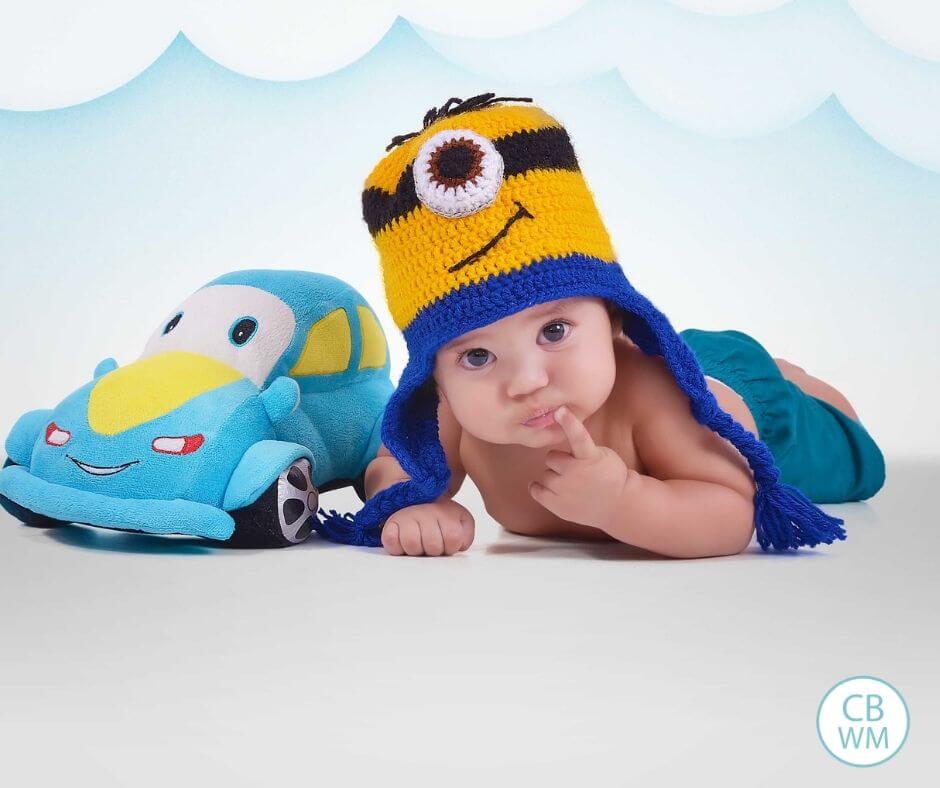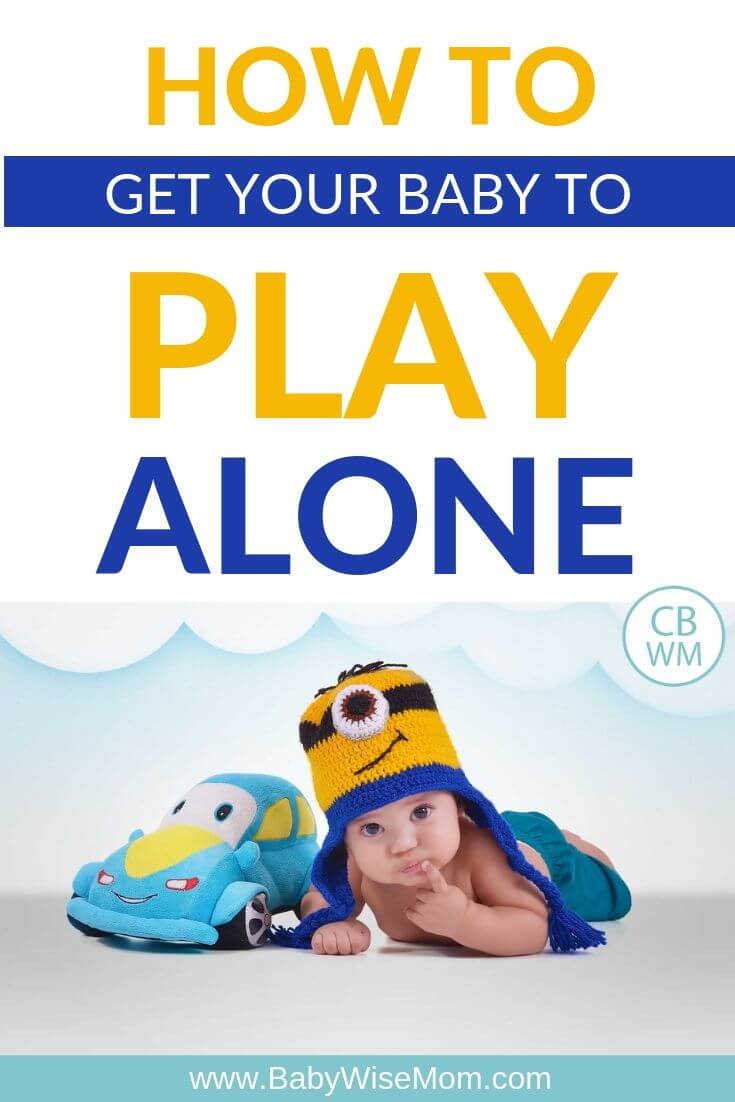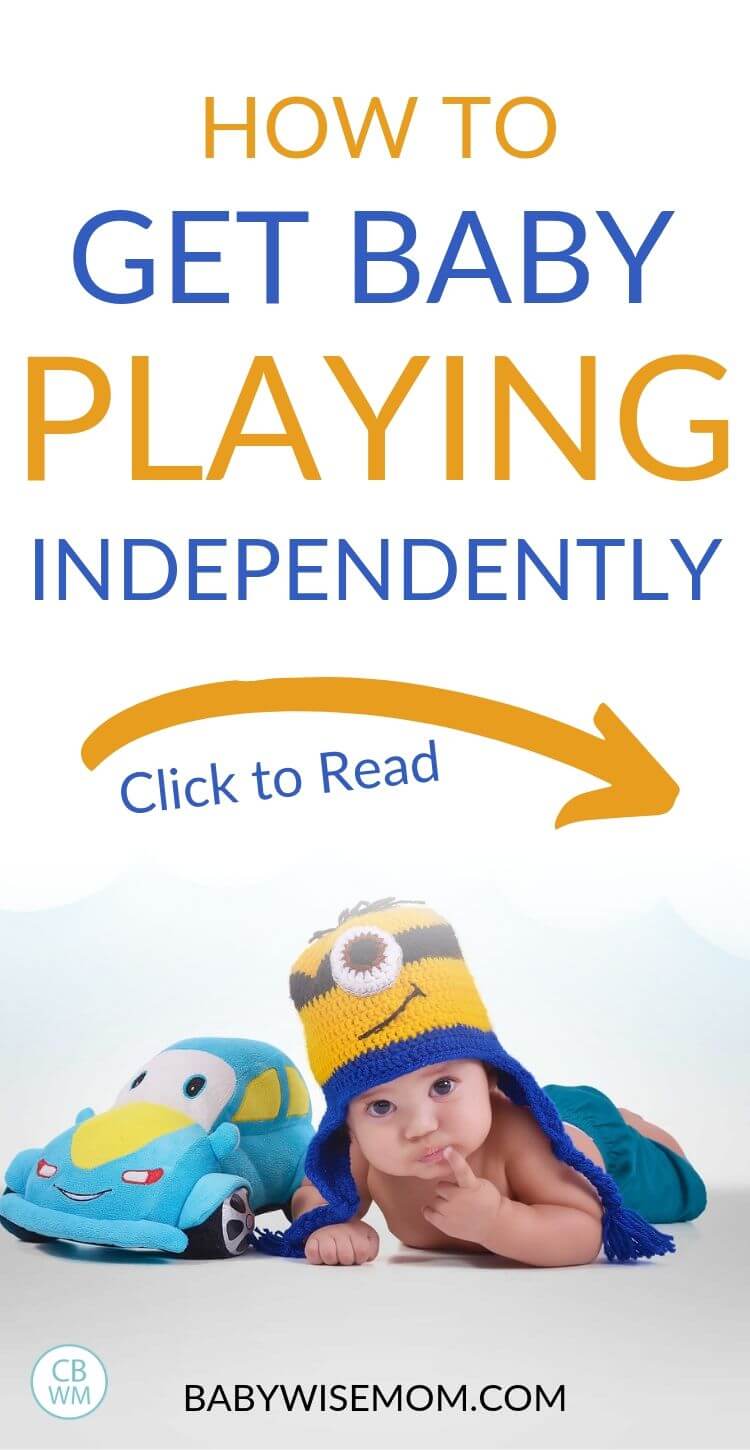Your baby CAN play alone happily! You do not need to entertain your baby every minute of the day and you even shouldn’t entertain every minute.

In The Baby Whisperer Solves All Your Problems, Tracy Hogg says that playing independently is a cornerstone of emotional fitness. She also points out that a child will not naturally get bored; a parent teaches the child to depend on adults for amusement. I have definitely seen this to be true with my children.
When Brayden was a baby, I felt guilty if he was awake and I wasn’t face-to-face with him interacting. It might have been a new mom-thing or it could have been a new-mom-who-is-an-extrovert thing.
Either way, it was not the best thing. I created a child who hated to play alone–ever. I worked with him and eventually he would play on his own during independent playtime.
At age four, he played on his own each day for 1-1.5 hours without a problem. However, when it was not time for independent play, he still turned to me to seek guidance on what he could do.
Read: Independent Playtime: The Ultimate Overview
When Kaitlyn was born, I knew I was going to be different. I had realized that it was okay for her to play on her own from birth. She didn’t need someone in her face at all times. She did independent play from the beginning with no problem.
By at age two, she played on her own each day for 1-1.5 hours. She also just entertained herself at all times. She never asked me what she can do with herself. If I have given her nothing to do, she makes something to do.
When McKenna was born, I was extra careful. I wanted to do as I had done with Kaitlyn, but had a new dimension to things. After reading the Baby Whisperer books, I knew that I needed to be careful about stimulation. While I was careful to not let myself be Kaitlyn’s sole source of stimulation, I also worried that she would be bored or not have enough stimulation. With McKenna, I have realized that she doesn’t need a lot to have stimulation.
Read: How To Calm Your Overstimulated Baby
At four months, she was still content to be on the floor and watch the ceiling fan for 20 minutes. She didn’t need me to stimulate her.
It worked so well for McKenna that I followed suit with Brinley.
Brayden is my most introverted child, but because of how I had trained him to need stimulation as a baby, he required the most of my efforts to be entertained as a baby. McKenna and Brinley are both extreme extroverts and were always great at entertaining themselves.
Post Contents
The Importance of Play for Babies
Playing is important for babies. As your child can play on his own, he will be able to entertain himself, explore without fear, and experiment (page 87). He will learn how to manipulate objects and learn cause and effect. He will also learn to tolerate frustration and to be patient. He will also come to know that it takes practice to get good at things.
Read: Why You Shouldn’t Overstimulate Baby During Playtime
Hogg points out that in order to help your child to learn to play on his own, you need to be careful to not hover. You can be helpful, but don’t want to become “Director of Amusements” (page 84). She gives some guidelines for the different age ranges. Take note that the abilities described here are assuming your child has been taught to play on his own from the beginning. If not, expect some variation.

Steps to Get Baby To Play Alone
0-6 Weeks
- Expect no more than for your baby to eat and sleep
- Your face is the best toy for him right now
- You talking to him is enjoyable
- Waketime will be at most 15 minutes after a feeding
- He can look out a window or look at his mobile
6-12 Weeks
- He can play on his own for up to 15 minutes
- Avoid the toys with bright lights and vibrations
- He will enjoy observing his surroundings
- Continue to talk to him
3-6 Months
- He should be able to play on his own for 15-20 minutes before getting fussy
- Respect his need for breaks from you and family trying to illicit his smiles and giggles
- When he pokes himself, don’t be too fast to rush to him. When you do get him, don’t act like it is the end of the world
- He will enjoy grabbing at things
6-9 Months
- He should be able to play on his own for 30 minutes or more
- He will enjoy books
- He will enjoy nursery rhymes and songs like “Wheels on the Bus”
- Make sure too much isn’t going on around him (vacuum, TV, siblings…)
- Include outside time
- You might also want to start some social time around other children
9-12 Months
- He should be able to play on his own for at least 45 minutes
- Sand and water are fun (but you will want to supervise)
- Big boxes and pillows are fun
- He will enjoy pots and pans
- “At this age, children have no concept of time, so once they’re secure it doesn’t matter whether you’re gone for five minutes or five hours” (page 87). BUT this doesn’t mean it is okay to leave your child alone for five hours during playing time 🙂
- Remember to change out the old toys and bring in new, more age-appropriate toys
Read: Great Toys to Encourage Independent Playtime
Conclusion
Independent Playtime is very possible to attain with your baby. It is one of my favorite parenting tools and the essence can be carried into even the teenage years. It is so worth all of your efforts.

RELATED POSTS
- Benefits of Independent Play
- Independent Playtime
- Independent Playtime Lengths
- Resistance to Independent Playtime
- Independent Playtime Benefits
- Factors that Influence a Child’s Learning
- The Learning Process for Toddlers
- How To Get Your Child To Play Happily Alone


